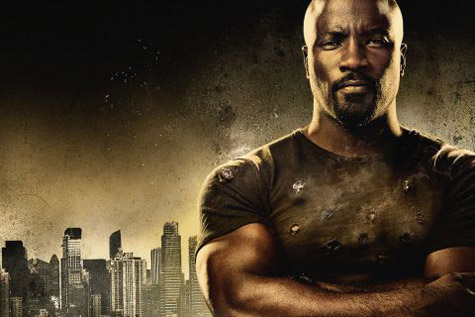
Luke Cage arrives on Netflix with a lot of cooks throwing a great many ingredients into the pot, and while that’s usually a recipe for disaster, the show isn’t just passable, it’s goddamn amazing. It’s hard to pick out the single greatest element (the music and the way it’s used may even be superior to the terrific cast and great direction), but let me focus on how it tells a compelling crime story in a way that mixes social relevance with pathos without losing any of the superhero excitement that spawned the show in the first place.
There’s enough material in Luke Cage for a thousand master’s theses, especially on the topics of race relations, Blaxploitation cinema, and economic conditions that engender crime. The more one peers into the show, the more there is to unpack, and it’s not merely viewers seeing what they want to see. Characters openly discuss ethnic identity and social inequality, and it’s impossible to miss the blackness of the show: Luke Cage has a black lead, a predominantly black cast, a black creator/producer, musical performances by black artists, a score by Ali Shaheed Muhammad of A Tribe Called Quest, and is set in the most famous black neighborhood in America.
All this is pretty heady stuff for a comic book character created to cash in on a 70s cinematic craze. Luke Cage, aka Power Man, was never a Marvel superstar and probably never played on Marvel’s farm team—until recently (following a revival by Brian Michael Bendis, who has a knack for both crime stories and bringing back obscure superheroes). When he first appeared, Power Man wore a getup that seemed more disco than Avengers and spouted dialogue that sounded like white guys awkwardly trying out “black” voices (“Fo’ sho’,” “Ain’t nobody gonna tell me…” etc.)—even though the original inker for the series, African American artist Billy Graham, began contributing to the scripts at some point.
But something about the character clearly caught on, and he outlived the Blaxploitation film trend that spawned him, possibly because what made Marvel comics unique from other companies was their diversity—the stories set in New York were full of people who reflected the real New York’s ethnic mix—and nixing one of their few black heroes would have eroded that distinguishing quality.
It’s hard to say if Luke Cage made a statement about African-American life or not any more than Superman illuminates aspects of the Jewish-American experience. Did black Americans have run-ins with Doctor Doom, or was running into colorfully-dressed criminal archers something everyone in Harlem could honestly relate to? While Luke may have sparked some recognition in non-white readers, looking for depth in a comic character’s subtext doesn’t typically lead anywhere. But the Netflix series Luke Cage shows a surprising facility with this. His shoulders support more themes than I could reasonably discuss here.
For starters, there’s the notion of having a main character that’s an African-American man who only wants to be left in peace but keeps getting shot at anyway. Only the bullets can’t kill him. What might have been a standard cliché in comic books decades ago now seems like a major statement, a metaphoric response to a serious American crisis. But let me not rise above my pay grade here, and instead stick to the superhero sagas that are my bread and butter.
Episode 1: “Moment of Truth”
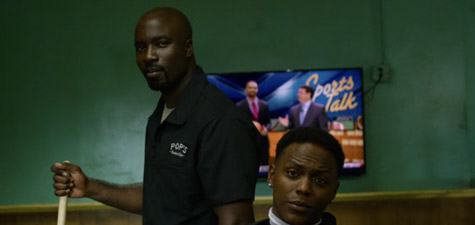
Following his fling with Jessica Jones and the disastrous end of his bartending career, Luke Cage (Mike Colter) has relocated to Harlem where he keeps his head down and works several sucky jobs in order to survive. Sweeping up at Pop’s Barber Shop, he meets several neighborhood characters, including a brash young guy named Sameek (Jarmel Howard), who’s friends with a young barber working for Pops named Chico (Brian ‘Sene’ Marc). When Luke sees Chico leaving work with a gun in his pocket, he knows things are going to get ugly but doesn’t stop him.
Luke’s other job is washing dishes at Harlem’s Paradise, a nightclub owned by Cornell “Cottonmouth” Stokes, played magnificently by Mahershala Ali. When he has to sub for an absent bartender named Dante, Luke catches the eye of a woman at the bar—Misty Knight (Simone Missick). I should note here that Colter’s attractiveness is acknowledged by quite a few people even within the show, which is hardly surprising given that the actor clearly regards his gym membership as a sacred bond. Misty and Luke go back to his place after his shift where he serves up a sex on the beach, minus the beach.
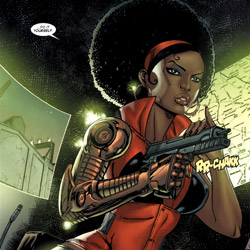 I don’t want to complain about Missick at all, who’s a terrific actress, though the fanboy in me misses the Misty Knight from the comics—a blend of Foxy Brown and Cleopatra Jones with a wardrobe borrowed from Emma Peel and gadgets reminiscent of James Bond. And, yes, a bionic arm. I had always thought that if Serena Williams wanted to go into acting, Misty Knight would have been the perfect role (now that Pam Grier’s done with action stuff), but that would be a very different show.
I don’t want to complain about Missick at all, who’s a terrific actress, though the fanboy in me misses the Misty Knight from the comics—a blend of Foxy Brown and Cleopatra Jones with a wardrobe borrowed from Emma Peel and gadgets reminiscent of James Bond. And, yes, a bionic arm. I had always thought that if Serena Williams wanted to go into acting, Misty Knight would have been the perfect role (now that Pam Grier’s done with action stuff), but that would be a very different show.
The centerpiece for the first episode is a robbery where Sameek, Chico, and Dante ambush one of Cottonmouth’s gun deals, killing Cottonmouth’s men in the process. Since Dante was the one who arranged it, Sameek decides to silence the likeliest suspect and shoots Dante, who survives just long enough to call Cottonmouth and let him know what happened.
None of this violence is played for tension; the show cuts from the shootout to singer Raphael Saadiq, as himself, crooning in Cottonmouth’s club, his slow love song transforming into a kind of elegy in the process. It’s one of the several astounding scenes in which the show uses music to guide the ideas and emotions of the scene. Sameek and Chico’s adventure in crime isn’t anything but woeful, and Saadiq’s singing reinforces the meaninglessness of the killings and how familiar such crimes are.
Well, Cottonmouth is not happy about losing his money, and his cousin, Councilwoman Mariah Dillard (Alfre Woodard), isn’t happy about that either, since Cottonmouth was funneling that cash into her campaign projects. So the money has to be retrieved, and our antagonist goes after the culprits that Dante identified. In short order, Cottonmouth has beaten Sameek to death with his bare hands and retrieved half of his loot; now all he needs to do is find Chicho and the other half.
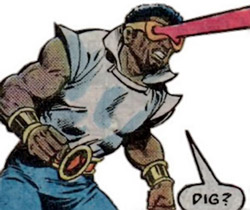 His supplier, an unseen bigwig named Diamondback, sends a dangerous thug named Shades (Theo Rossi) to help Cottonmouth and see if maybe he’s not holding things together like he said he was. Shades, by the way, is one of the rare examples in recent Marvel history of taking a black character and changing his ethnicity; in the comic, Shades was a guy who, like Luke, wore a ridiculous funky costume, as well as a visor that basically gave him the powers of the X-Men’s Cyclops. The change here is welcome.
His supplier, an unseen bigwig named Diamondback, sends a dangerous thug named Shades (Theo Rossi) to help Cottonmouth and see if maybe he’s not holding things together like he said he was. Shades, by the way, is one of the rare examples in recent Marvel history of taking a black character and changing his ethnicity; in the comic, Shades was a guy who, like Luke, wore a ridiculous funky costume, as well as a visor that basically gave him the powers of the X-Men’s Cyclops. The change here is welcome.
At the mention of Diamondback, the show takes an interesting turn—if Cottonmouth is the villain, and this is a superhero story, then it’s only a matter of time before Luke administers the righteous beatdown to his nemesis. But maybe, just maybe, Cottonmouth isn’t the villain after all. Ali’s performance makes it clear that he’s the kind of guy who doesn’t need to be pushed very far before he starts ending people’s lives, but on the other hand, he’s a smart, perceptive, occasionally contemplative man who regards the law not with contempt, but with healthy skepticism.
One thing that unites almost all the characters in the show—especially Luke, Cottonmouth, and Mariah—is this constant need for money. With it, they’re all set, but without it, they might as well have one foot in the grave. For Luke, not having money means having to dodge his landlord, the owner of a Chinese restaurant. For Cottonmouth and Mariah, the consequences are far more serious. Mariah has big dreams of investing in Harlem, and Cottonmouth has to keep supplying his customers with firearms while maintaining a working relationship with several gangs.
Luke finally makes up for his late rent payments by ridding his landlady’s restaurant of goons who are shaking the place down, collecting for Mariah’s slush fund. The music accompanying this particular beat-down is unlike the rest of the soundtrack, reminiscent of Ennio Morricone’s Western scores. Luke promises that he’ll stick around and protect the place, but … he’s not for hire. Yet. (Keep in mind that his comic was subtitled “Hero for Hire.”)
Episode 2: “Code of the Streets”
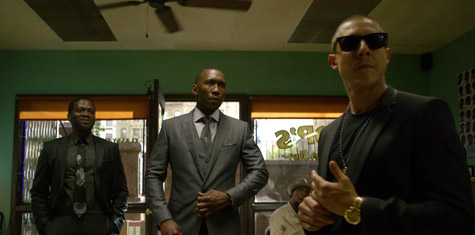
So the first episode is all about setting the characters up, and Episode 2 sets them in motion. Luke’s desire in the first episode to remain unnoticed seems like passivity, which isn’t easy when you’re a towering musclebound man who can’t be hurt, and downright impossible when you’re the star of a Netflix superhero show.
But at Pop’s Barber Shop, he’s just a guy who pushes a broom. The barber shop is one of the things that makes Luke Cage so singular; it’s a lived-in space full of memorable characters, where the dialogue is top tier. Pops, himself (Frankie Faison), is a terrific character who functions as a guardian of the peace in Harlem and as a surrogate father for Luke. Pops reveals during one private conversation with Luke that, during his younger years, he was no angel. His nickname doesn’t refer to his paternal nature but to the sound his fists made slamming people in the face.
And, one of his fellow junior gangbangers was … Cornell “Cottonmouth” Stokes. Cottonmouth swings by the barber shop with his goons, including Shades. Cottonmouth says he’s there for a shave, but really he’s delivering a message: If anyone knows where Chico can be found, they better speak up. In this Harlem, good men like Luke and Pop are forced to go about their lives in the presence of a very dangerous killer. And it’s not like they have a lot of room to tiptoe around this guy. He’s there, in their faces, and they have to look him in eye and say something that doesn’t have him reaching for his gun.
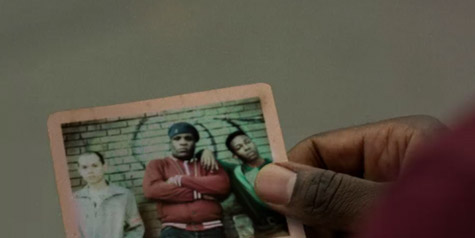
Misty and her partner Detective Rafael Scarfe (Frank Whaley—where has this guy been?) are also looking for Chico, and there’s a great scene where Misty, grilling guys on the basketball court where Chico used to play, challenges a likely witness to a game of horse, sinking shots from the three-point line (Simone Missick, who was a varsity basketball captain, actually sank those shots herself—wearing heels! Holy crap, this show’s got TWO superheroes!). But in the end, it’s Luke, pounding the pavement, who finds Chico in a flophouse hotel.
Luke searching for Chico really reinforces the unique setting. Harlem in this show is definitely no set. The legendary neighborhood has a very distinct look and vibe (one that, admittedly, I know more from television and films than from personal experience), and it makes for a stronger show to see Marvel superheroes moving uptown.
Luke convinces Chico to come to Pop, who’ll negotiate his safe passage out of town if he hands Cottonmouth back his stolen money. But Cottonmouth’s aid Tone (Warner Miller) decides to go around his boss and deliver the kind of judgement he thinks his boss would want, so he comes to the barber shop with two fully automatic weapons and blasts the place apart, killing Pop and wounding Chico. Luke is there too, which is fortunate for the shop’s lone customer, whom Luke shields with his bulletproof frame.
In the buildup to the carnage at the shop, Faith Evans is wowing them at the club, delivering a powerful version of her hit “Mesmerized.” It’s another astonishing scene in which menace is interspersed with a musical performance, even gaining emphasis from it. As with Raphael Saadiq’s performance in the previous episode, these are the scenes that the show does better than anything else.
When Cottonmouth finds out what Tone has done, he handles the murder of his old comrade in a moderate, businesslike fashion: he throws Tone off the roof of his nightclub. So who’s left standing at the end of this episode? Well, Luke, definitely, who is now out to avenge Pop. It’s on, people. Luke Cage has had it.
Episode 3: “Who’s Gonna Take the Weight?”
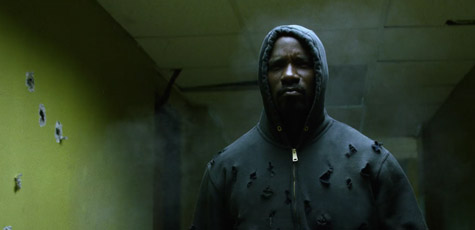
Misty, who hasn’t been a minor player in any of this, comes more to fore in the third episode. She knows that either Cottonmouth or someone from his gang killed Pop, but she also suspects that Luke Cage’s abilities go far beyond taking her to heaven and back.
Luke, meanwhile, figures out (with the help of Chico) a plan to hit Cottonmouth where it hurts and to keep Pop’s barber shop open in the process. By storming the various places where they store the profits of their street extortions, Luke forces the crooked cousins to move all of their ill-gotten gains to the heavily armed and guarded Crispus Attucks Housing Complex. Yet again, the violence—this time Luke smashing his way through the storehouses and the goons that guard them—is intercut with a performance at Harlem’s Paradise, this time Charles Bradley singing an accusatory little number called “Ain’t it a Sin.” (Sample lyric: “If you ain’t gonna do me right/I might just do you in.”)
So with the money in one location and Cottonmouth and Mariah in a state of near apoplectic panic, Luke waltzes into the Crispus Attucks Complex, armed with nothing but a door he ripped off an SUV and Wu Tang Clan’s “Bring Da Ruckus” on his headphones. Guns are fired, henchmen are pummeled, property is disrespected, a sofa goes flying through a window, and Luke barely bats an eyelash.
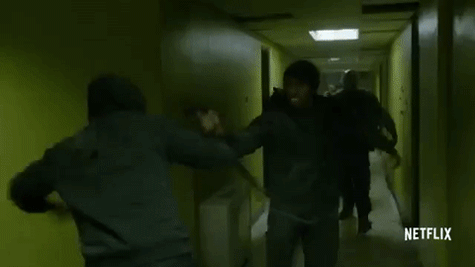
Friends, this is the super-powered battle that we’ve been waiting for, and every breakaway-plywood-enthusiast to ever purchase a comic will feel a powerful sense of fulfillment. Luke takes some of the money, but not much; the police seize the rest of it when they come investigating, and, again, Misty picks up on some curious details. How come none of the guards at the scene were killed? And how were all those shots fired without killing anyone? Are we looking at a vigilante?
Scarfe tells Misty that if there is a freelance crime fighter at work, he’s fine with that. He’s happy with anyone who wants to save cops trouble. But then Scarfe goes to meet Chico, who tells him he’s ready to give the cops everything, even name some names. Before he can say “Cottonmouth,” Scarfe strangles Chico and heads to Cottonmouth with news on where to find this troublemaker, Luke Cage. Now we know who’s the good cop and who’s the bad in the Misty/Scarfe partnership.
At the Chinese restaurant, Luke pays his landlady for the damage he caused to her establishment at the end of Episode 1, but he’s going to owe her a hell of a lot more, because Cottonmouth abruptly launches a motherfucking shoulder-mounted missile at the building, bringing it down on our hero.
Episode 4: “Step in the Arena”
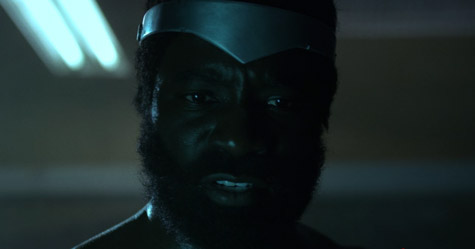
Luke’s origin story! At last! And Jesus, is it brutal.
Trapped in the rubble of his apartment building, Luke is, as always, unharmed, but his landlady Connie (Jade Wu) has got a broken leg—which, given that she was in a building that got blown apart by a bazooka and then collapsed, isn’t too bad, all things considered. The darkness brings back memories of a time in Luke’s life that somehow was even worse. Viewers are transported to a charming maximum security facility known as Seagate, where a sadistic head guard named Rackham makes life as unbearable as he possibly can for the inmates, alerting them all to one prisoner named Carl Lucas, a former cop. So have at him, boys.
But Carl isn’t on anyone’s list aside from Rackham’s, who, it turns out, wants the big guy to participate in a fight club he and some other guards have set up in the prison basement—a proposition that sounds to Carl like signing up for slavery. But the prison is also the workplace of Reva Connors (Parisa Fitz-Henley), a therapist who gets Carl to open up. When Rackham learns who Carl’s friends are, he finally has leverage, and Carl begins his descent into the world of human cockfighting. And he’s very good at it.
But he’s keeping his eyes open, and he’s going to expose the whole rotten system with Reva’s help—until that plan is put on ice by another prisoner named Shades and a crony of his, who beat Carl to a pulp. In the prison hospital, Reva urges the doctor to perform an experimental procedure on Carl to save his life, one that he clearly has performed on other unwilling inmates. Immersed in some kind of chemical bath, Luke’s treatment is interrupted by Rackham, who, in true Spinal Tap fashion, turns it up to eleven, overloading the weird science equipment and destroying yet more property, along with himself.
But not Carl, who comes out of the sparking tub a changed man—one who’s able to rip apart prison walls with his bare hands. Away from Seagate, he finds Reva, and they plot their new lives together. Carl takes a cue from his preacher father—Luke Chapter 4, Verse 18 is the source of his new alias.
One of the highlights of the episode is a scene where Carl steals some clothes as he makes his way to Reva, and looks at his reflection, decked out in a yellow blouse with puffy sleeves, still wearing the metal headband that the doc put on him prior to the experimental treatment. It’s actually Luke Cage’s original costume from the comics, and just by putting Colter in it for one brief scene, the show makes clear that not everything from the comics needs to be used in the show. See my earlier remarks about Misty’s changes.
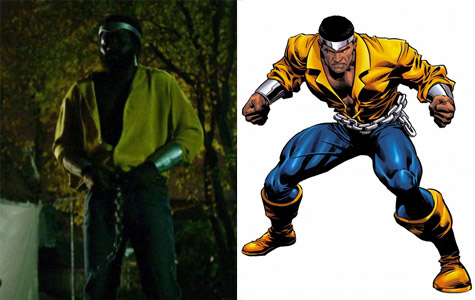
Back in Harlem, Luke climbs out the rubble and saves Connie, right in front of an incredulous Misty (If she hasn’t figured this guy out by now, she owes the police department her detective’s badge).
What’s next? Luke could always just beat his foes to death, and at this point no one would blame him, but he shows all the signs of knowing that the direct route may not get him the revenge he wants. We shall see the route he takes to retribution in the next set of episodes.
Check out our coverage of Daredevil and Jessica Jones!
Hector DeJean can frequently be found in comic stores, bookshops, and the Eighties. His serialized story of a private detective who only solves food-related crimes is no longer online.
